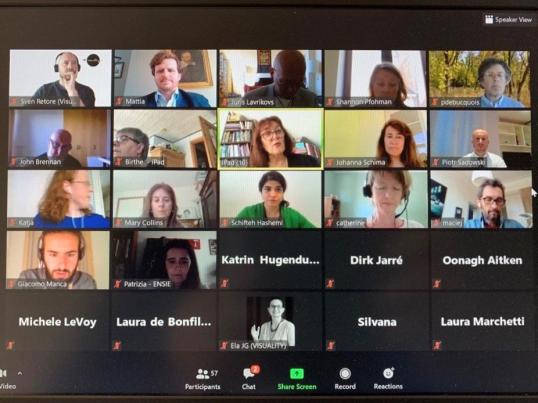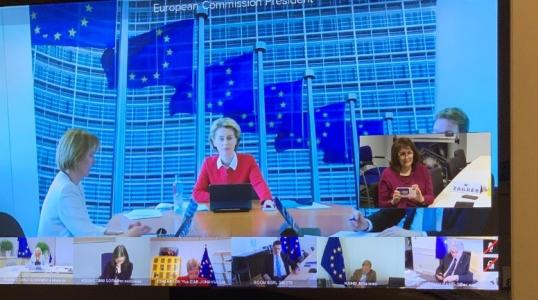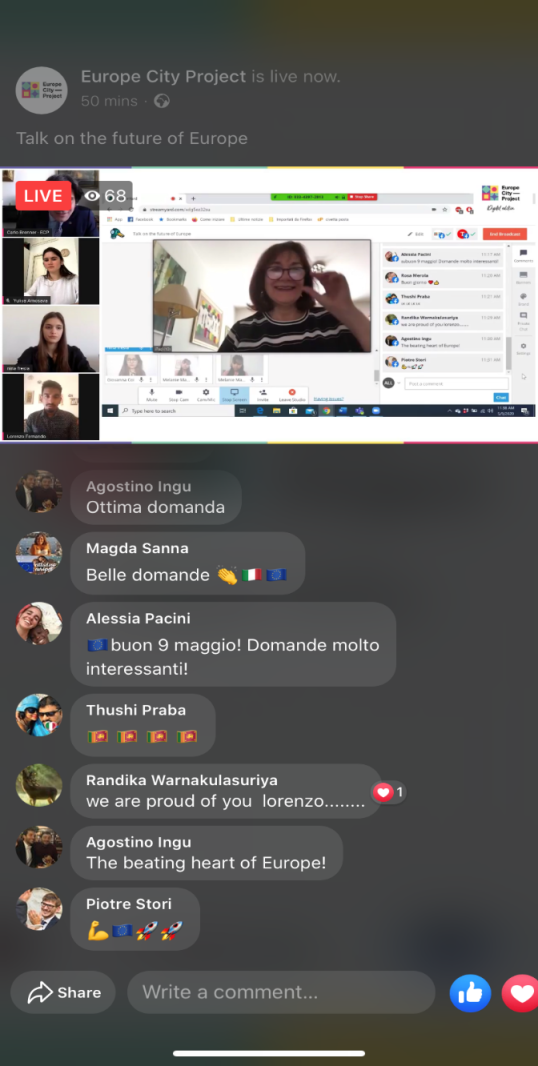I have always been someone who enjoyed being among people, so the shift to confinement and working via video-conference has not been an easy one. Nevertheless, we are all learning to work in a different way and hopefully this may also have an impact of how we manage our work/life balance.
After a two-month long collective effort to stem the spread of the COVID-19, we are now approaching a new phase of our lives in our Union. One that builds the present and the future, leaving no one behind.
To rebuild, we must put the European Union on a path of sustainable recovery and growth. We need to answer some difficult questions about the present to be able to shape a better future. Burning issues such as climate change, demography, the need to accelerate digitalisation and to protect our democracy have now become very tangible challenges, and opportunities.
The COVID-19 crisis has not stopped the von der Leyen Commission from stepping up its efforts and adopting a series of measures to respond to this pandemic. Through daily online meetings and weekly virtual College meetings, we presented emergency measures and policies to help member states and their economies, first to exit from the crisis and then to propose a comprehensive Recovery Plan which will be based on the new MFF.
COVID-19 and demographic challenges
The virus has not had the same impact everywhere. The demographic makeup of states, regions and towns has played an important role in the development of critical cases: age structure, population concentration, household composition and intergenerational interactions have shaped the spread of COVID19 in the European Union. Understanding those particular issues has assisted us in designing a first response and setting out a roadmap towards lifting containment measures, and it will help us devise plans for further action.
My team and I have been working on a Report on the impact of demographic change that will help shape the policy debate in Europe on how we can best support people and regions to adapt to changing realities. The Report was originally scheduled for adoption in April, but it has been postponed, together with other initiatives, to give space to emergency actions in relation to coronavirus crisis management. We are now considering the best timing for its publication, as demography plays a crucial role and is a solid basis for us in devising recovery strategies.
This Report will be followed by a number of initiatives that flow from its findings. The first will be a Green Paper on Ageing, which will launch a broad consultation, including on how an ageing Europe can ensure the sustainability of pension and care systems.,It will seek to transform this challenge into a new opportunity, especially in harnessing the extremely valuable silver economy. Nevertheless, the elderly are among those most at risk of the current pandemic. We need to field greater efforts towards inter-generational solidarity, and ensure that our care systems are resilient and equipped to provide the services needed.
The pandemic has highlighted a massive challenge in the form of loneliness. Social distancing has become the norm, the biting feeling of loneliness has been an unwelcome companion to far too many Europeans. Those already prone to isolation, such as the elderly or people living alone, have been particularly exposed to it. This is not a new phenomenon, yet it is now revealed as never before and has significant social, economic and health implications that deserve our attention.
By the end of the year, we will also be launching a public consultation for our Long-term strategy on rural areas. Our ambition is to make these areas vibrant, dynamic and attractive and to give them a renewed perspective. The consultation will help us to take on board many good ideas from the public to make this new vision a genuine success.
Safe environments for our children
While elderly people are certainly among those most affected by the novel coronavirus, it has not spared children: the impact has been considerable and the mid-to long-term consequences, if left unaddressed, should not be underestimated.
Children have seen their education disrupted, many experience emotional distress due to social distancing and increased poverty, especially when already living in precarious situations. Access to services needed by the most vulnerable, including those with disabilities, minorities, migrant children and asylum seekers, is even more limited. Statistics are alarming: domestic violence has been on the rise during the confinement, with children and women most affected.
We need to address the immediate health and socio-economic impacts of COVID-19, meet the needs of children, support communities, health systems and health structures, strengthen protective services, access to child friendly justice. These recent developments will also be taken into account for the comprehensive EU Strategy on the Rights of the Child we are working on. Children must not become the silent victims of the COVID-19 crisis.
Building the present and Future of Europe
During this crisis, the weaknesses of our Union were exposed but simultaneously, the European spirit and solidarity grew stronger, and the EU acted and showed its strength and raison d’etre in the face of adversity. We need to build on that, acknowledge our shortcomings and turn these into our strength.
The Conference on the Future of Europe, in this new context, assumes an even more important role. European citizens should have a greater say on what the Union does and how it works for them. The experiences made during this crisis will affect the future of the European Union.
The circumstances have forced us to rethink some elements of the Conference, but rest assured that the substance remains the same: this exercise in deliberative democracy will help us build a better European Union. We will make sure that ideas found in local discussions are debated at EU level and are brought to the attention of the political representatives and that they are followed-up on.
We recently marked Europe Day. This year it is the 75th anniversary of the end of the Second World War and the 70th anniversary of Robert Schuman’s Declaration, whose bold ideas changed our continent for good and for the better.
Let us now again be brave and dare to create a new political dynamic that can complement our representative democracy and strengthen the relationship with citizens and build upon Schuman’s vision. Let us have the courage to make the Conference on the Future of Europe a success for both the present and the future.
Keep strong, safe and healthy! #UnitedAgainstCoronavirus
Details
- Publication date
- 20 May 2020
- Author
- Directorate-General for Communication



